Wednesday, April 10th, 2013
By Carolyn Yeager
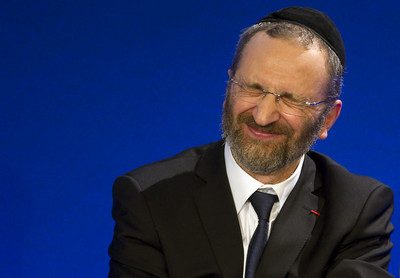 Just recently, the Chief Rabbi of France, Gilles Bernheim, has admitted to plagiary and lying about it.
Just recently, the Chief Rabbi of France, Gilles Bernheim, has admitted to plagiary and lying about it.
He is a 60 year-old “trained philosopher” who was elected in 2008 as the religious leader of the third-largest Jewish community in the world, numbering approximately 600,000. (Note the two symbolic sixes in the foregoing.) At issue were several parts of his book Forty Jewish Meditations that were found to be taken from other sources.
Right: The Great Rabbi of France Gilles Bernheim attends the UMP party‘s debate on secularism in Paris, France, April 5, 2011. No, he’s not blind, maybe just exhibiting his affinity for denial.
The plagiarizing is one thing; the trail of lies this flawed man came up with to deny it is the real scandal. Just last December, Pope Benedict XVI quoted from a recent essay by Bernheim on same-sex marriage; now there are charges that parts of that essay, too, were similar to the work of others. On Monday, a French Web site, Archeology of Cut and Paste, accused the rabbi of using passages in his essay that were close to those in a book by a priest, the Rev. Joseph-Marie Verlinde. No wonder the Pope liked it!
The exposure of the plagiarism started in March (last month) when a website named Strass de la philosophie discovered similarities between Bernheim’s work and an interview of the philosopher Jean-François Lyotard in the 1996 book Questioning Judaism by Elizabeth Weber.
A few days later, in a childish, yet cynical attempt to cover for himself, Bernheim answered by saying that some of the meditations in the books were transcripts of lessons he gave in the 1980s, as a chaplain for Jewish students, and that these lessons were often recorded while copies of his personal notes were handed to pupils – thus implying that Lyotard, who died in 1998, plagiarized him, and not the opposite.
But Elizabeth Weber subsequently refuted Bernheim’s version, saying that Lyotard had answered her questions without any notes. Also, Jean-Noel Darde, a senior lecturer at Paris 8 University, who runs a website that specializes in academic plagiarizing, suggested that the Chief Rabbi might have also used fragments of other books, written well before the 1980s, by authors such as Elie Wiesel, Jean-Marie Domenach and Charles Dobzynski.
Faced with this, the rabbi then blamed inadequate oversight of a student who did some of the writing. He said he had hired the student because of a busy schedule and had not informed his publisher of the arrangement. “It is the one and only time I made such an arrangement,” he wrote in a statement. “It was a terrible mistake. I have been fooled. However, I am responsible.” He also apologized for initially denying the accusation, calling his reaction “emotional, hasty and clumsy.” He said. “I retrospectively analyze it as denial.”
However, further proof of the man’s lying nature emerged when it was shown that Rabbi Bernheim had claimed an academic achievement that he had not earned. His Who’s Who entry, based on information he provided, says he was awarded from the Sorbonne an “agrégation de philosophie,” an elite and highly competitive academic distinction. But there is no record that he won such an honor. (Who does that remind you of?)
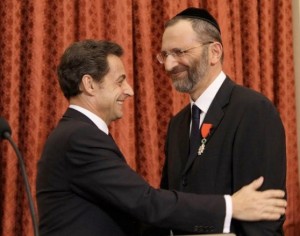 Left: Bernheim with former French President Nicolas Sarkozy, also a Jew, who awarded him the Legion of Honor in 2010. Sarkozy said twice that Bernheim is an “agrégé de philosophie,” a very competitive academic distinction in France. Bernheim did not contradict him.
Left: Bernheim with former French President Nicolas Sarkozy, also a Jew, who awarded him the Legion of Honor in 2010. Sarkozy said twice that Bernheim is an “agrégé de philosophie,” a very competitive academic distinction in France. Bernheim did not contradict him.
There is growing pressure for Rabbi Bernheim to resign, but in a radio interview Tuesday night, he said he would not step down, adding that although he had made mistakes, “I have not committed fault in the exercise of my functions” as France’s chief rabbi. [UPDATE: On Thursday, the rabbi-in-denial faced reality and resigned. See here.]
At the same time, some fellow Jews rush to defend him. Richard Prasquier, a friend of the rabbi and president of the Representative Council of Jewish Institutions of France, appealed to him to set the record straight and spoke movingly of the “torment” the rabbi must feel. Oy vey.
“Gilles Bernheim is my friend,” Dr. Prasquier said in an editorial on Tuesday in the organization’s newsletter. “A life like his cannot be hostage to a few failures in an area of intellectual or academic qualification related to his activity as a rabbi.” Dr. Prasquier said Rabbi Bernheim ought to be able to continue in his job, “where he has presented, in an eloquent voice, a Judaism open to the city and rigorous in its principles.”
The position of Chief Rabbi of France comes via the Centrale Consistoire, which was created in 1808 by Napoleon to oversee Jews in France. It was intended to make sure the unruly Jews followed the laws of France concerning military service, especially, and should take up mechanical trades; but that was lost sight of long ago.
Nobody ever said that Jews held high standards for themselves. The fact that Bernheim told pathetic lies implicating innocent persons in wrong-doing that he knew was his own doing, is inexcusable in a religious leader of any rank, let alone the highest rank. However, lying about his record at the Sorbonne, giving himself high academic distinctions that were never his, is actually typical Jewish behavior. We see it with Elie Wiesel, too.
How does this relate to Elie Wiesel, or to Kenneth Waltzer?
It relates to Jews who hold respectable, responsible positions in society, who are not really qualified, in spite of degrees from the Sorbonne or Harvard. These men WILL make mistakes and will cheat. In the case of Wiesel, every degree he has is honorary, and not much is expected of him. But in the case of Waltzer, he’s expected to demonstrate serious academic ability which, so far, he has not. I will be returning to this theme, and to three photographs which have been claimed to be Elie Wiesel, that are tied to key elements in the story of Elie in Buchenwald. These three photographs can be seen here, here and here. All three have been mislabeled, and there is no effort at all to correct the record. Just as there has been no effort to answer to Verena Dobnik’s false claim that she saw Elie Wiesel’s “death camp” tattoo during her interview of him in October 2012.
All of this will be tied together under the banner of perpetual lies by people in high places. But to what degree is Elie Wiesel the source of them? Who is running the show?
Note: The information about Bernheim for this article came mostly from The New York Times and Worldcrunch.com.
30 Comments
Category Featured | Tags: Tags: Chief Rabbi of France, Elie Wiesel, Elizabeth Weber, Gilles Bernheim, Jean-Francois Lyotard, Plagiary, Richard Prasquier, Sorbonne,
Social Networks: Facebook, Twitter, Google Bookmarks, del.icio.us, StumbleUpon, Digg, Reddit, Posterous.
Wednesday, March 30th, 2011
by Carolyn Yeager
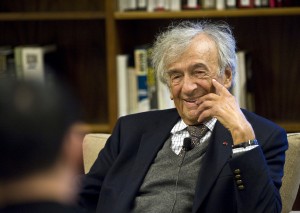 Elie Wiesel arrived at Chapman University in Orange CA on Monday, March 28 in his new capacity as “Distinguished Presidential Fellow” and gave a lecture titled “Knowledge and Ethics.” He also spoke to a small class of Chapman Religion students. According to the Orange County Register [photo at right courtesy Paul Bersbach, OCR], he “answered several questions, but posed many of his own.” This is typically the way Wiesel, 82, avoids revealing his ignorance of the entire topic of the concentration camps.
Elie Wiesel arrived at Chapman University in Orange CA on Monday, March 28 in his new capacity as “Distinguished Presidential Fellow” and gave a lecture titled “Knowledge and Ethics.” He also spoke to a small class of Chapman Religion students. According to the Orange County Register [photo at right courtesy Paul Bersbach, OCR], he “answered several questions, but posed many of his own.” This is typically the way Wiesel, 82, avoids revealing his ignorance of the entire topic of the concentration camps.
Wiesel’s contract with the university, and specifically with the Rodgers Center for Holocaust Education which is the real sponsor and driving force behind the contract, is for five years. Thanks to a bequest from Barry and Phyllis Rodgers, the Rodgers Center was opened in 2000 for the purpose of helping to keep the memory of the holocaust alive, well, and lucrative.
As we reported here last October, each spring semester Wiesel will deliver a lecture and carry on some interaction with students. Don’t think he’s doing it only in the interest of “keeping memory alive” or for any of the noble reasons suggested by Marilyn Harran, Director of the Rodgers Center and University spokesperson on matters pertaining to Wiesel’s fellowship.
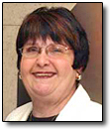
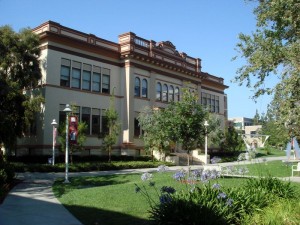
Left: Marilyn Harran. Right: Wilkinson Hall on the Chapman campus. The Rodger Center comes under the aegis of the Wilkinson College of Humanities and Social Studies.
As reported in the Chapman Panther newspaper on March 28, “Harran declined to say how much the Rodgers Center is paying Wiesel for his lecture. Mary Platt, director of communications and media relations, confirmed that the amount is confidential.”
It’s widely quoted that Wiesel’s standard speaking fee is $25,000. We don’t know how much he is charging for visiting with students in their classrooms, but it is no doubt substantial. Chapman’s wealthy Jewish donors who support activities at the special Rodgers Center for Holocaust Education and the Samueli Holocaust Memorial Library are apparently willing to pay it.
Harran, a professor in both the Religious Studies and History departments, is a devotee of Wiesel and his myth. She tends to speak of Wiesel in worshipful terms, as I reported in my Oct. 2010 blog post. At that time, she included these words in her announcement of his fellowship at Chapman: “We are unbelievably fortunate that he has chosen to return to Chapman and to share with us his knowledge and wisdom. I am stunned and deeply grateful that he will be with us in this new role as Distinguished Presidential Fellow. I know our university community will be profoundly enriched and inspired by his presence.” This is the cue for students to show the proper respect toward the visiting professor, and hang on his every word.
Harran is teaching a course this semester called “Elie Wiesel: His Life and Work” with Jan Osborn, professor of English. According to The Panther, only eighteen students are taking the course. Harran wrote a March 28th opinion piece for the school newspaper titled “Knowledge, ethics and Elie Wiesel” in which she mentioned his book Night and also said: “Some of you will recall seeing Wiesel visiting Auschwitz with Oprah Winfrey or standing by President Obama’s side at a commemorative ceremony in Buchenwald. These are powerful images. Indeed, it is hard to remember when the memory of the Holocaust did not have a place in our American life and culture. There are Holocaust documentaries and films; Holocaust museums in cities such as Chicago, Houston and Los Angeles, and the Sala and Aron Samueli Holocaust Memorial Library at Chapman. And there is the United States Holocaust Memorial Museum in Washington, D.C.”
Hurrah, hurrah. Isn’t it wonderful. She gives Wiesel much of the credit for bringing this about. She then asserts this historical tidbit: “the Final Solution was agreed upon in a 90-minute meeting attended by 15 senior SS officials and bureaucrats”—referring to the reputed “Wannsee Conference” in 1942 in Germany. But the meeting minutes show clearly that it was a discussion of the “final solution of the Jewish problem” as a deportation plan, not an extermination plan. So where does that leave Elie Wiesel’s story? And Harran is a PhD in History? It’s obvious she needs some help with knowledge and ethics herself.
Wiesel told the religion students that he studied literature at the Sorbonne University in France before he became a journalist for the Israeli paper Yediot Arhronot in Dec. 1949. I have shown in Questions on Elie Wiesel and the Sorbonne that that claim is false. Wiesel also told the students he cannot answer the questions: Why did the Holocaust happen? and Why did it happen to the Jews? But … “since I have survived, I feel I have a duty to do something with myself.”
In all their discussions of ethics, the pressing current persecution and torture of the Palestinians by Israel is never brought up. EWCTW will continue to report to you about Wiesel’s activities at Chapman. Contributions sent by readers are welcome.
* * *
Also see: Beyond Sensationalism: Writer Discusses Holocaust Literature. Ruth Franklin is on the book circuit trying to explain why holocaust memoirs are so full of fiction.
“From the very moment, it is imagination at work,” explained the writer. “There’s this myth that Holocaust texts emerged fully-formed from their creators. However, so much rewriting was done to tell the story in a more effective, memorable way.” Uh huh. sure.
2 Comments
Category Featured | Tags: Tags: Chapman University, Distinguished Presidential Fellow, Marilyn Harran, Rodgers Center for Holocaust Education, Ruth Franklin, Sorbonne,
Social Networks: Facebook, Twitter, Google Bookmarks, del.icio.us, StumbleUpon, Digg, Reddit, Posterous.
Monday, November 15th, 2010
By Carolyn Yeager
copyright 2010 carolyn yeager [updated 12-5-15 and 2-6-25]
Is Elie Wiesel lying about having enrolled at the Sorbonne University in Paris? Or is he a victim of confused memories?
Elie Wiesel wrote the following in his memoir (1) published in 1995:
With Francois’s help I enrolled in the Faculty of Letters of the Sorbonne. At last I found my vocation.
I have happy memories of my student years. There were lectures by Daniel Lagache in the Descartes or Richelieu amphitheater, and by Louis Lavell at the Collège de France. (2) I devoured books on philosophy and psychology, Plato’s dialogues, Freud’s analyses. I wandered from bookstore to bookstore, from park to park. I remember the silence of the Sainte-Genevieve Library [not at the Sorbonne] and the chance encounters and inevitable rendezvous in the Sorbonne courtyard. Francois, my tutor, guide, and friend, did his best to initiate me into the life of the Latin Quarter, taking me to hear Sartre and Buber, whose lecture on religious existentialism was an event. The hall was packed, the audience enthusiastic. Buber was treated like a prophet. His listeners were elated, conquered in advance, ready to savor every word. There was just one problem. Had Buber spoken in Hebrew, Yiddish, English, or German, there would have been some people in the hall able to follow his address. But he opted for French, and his accent was so thick no one understood him. Everyone applauded just the same. No matter, they would read the text when it was published. But I was delighted to have seen the handsome face and heard the searching voice of the author of I and Thou, one of the great Jewish spiritual thinkers of our time.
According to the book’s index, this is the only page on which the word “Sorbonne” is found in the entire book of 418 pages—twice on page 154. The above is all Wiesel has to say about his “student years” at this historic and revered institution of higher education. Yet in spite of its paucity, this paragraph is seemingly all it has taken for the majority of Elie Wiesel’s followers, biographers, interviewers, and promoters to repeat it without question, as I will show further on.
Wiesel gives no dates for what would be something of a milestone in his life, either—as is in keeping with his penchant for “free-floating memories.” The last date he gives that refers to his own actual life at the time, is way back on page 120: “Fortunately, in 1947 the OSE arranged for a young teacher, Francois Wahl, to give me private lessons.” He says more on the next page, 121:
In 1947, as the underground war raged in Palestine, Francois performed important secret tasks for a Jewish resistance group . The following year our paths diverged. Later, much later, they would cross again.
It was in 1947 that Shushani, the mysterious Talmudic scholar, reappeared in my life. For two or three years he taught me unforgettable lessons about the limits of language and reason, about the behavior of sages and madmen, about the obscure paths of thought as it wends its way across centuries and cultures.”
Francois was only one of many revolutionary Jewish “terrorists” Wiesel was associated with during this period. But more important to our theme is that it seems a strange juxtaposition for Wiesel to claim he is learning about the “limits of language and reason” from the most important teacher in his life (Shushani), by his own admission, while being an enrolled student taking courses at the Sorbonne University. The French Academy has always been known for putting great store in language and reason! We are left with another big contradiction in Elie Wiesel’s life story.
Other reasons to be skeptical of Wiesel’s claim
Prof. David O’Connell, a professor of French at Georgia State University, has written unambiguously that Wiesel was never enrolled at the Sorbonne:
Despite his claims over the years about having studied philosophy and psychology at the Sorbonne and doing a two year internship at the Hôpital Sainte-Anne in clinical psychology,(3) he actually never enrolled for any credit-bearing course at the Sorbonne, or any other branch of the University of Paris. Even worse, there is no evidence that he ever earned a French secondary school diploma. Yet, he now earns a huge six-figure salary per year as a Mellon Professor of Literature at Boston University, a position that theoretically requires a Ph.D.(4)
After O’Connell’s article was published in 2004, neither Elie Wiesel nor the Sorbonne University provided any evidence to the contrary. Searching for a clue on the Internet, I came only upon evidence of the well-known Internet trend (5) of copying from other sites and sources without the slightest direct research being done. What I did not find was anything from Elie himself, in speeches, writings, interviews, about his “happy years” as a student at the Sorbonne, or anything to do with his education. In the examples listed below, the original source from which the information came is not given, nor is it known in most cases, because it was doubtless copied from someone who copied it from somewhere else. In some cases, the 1995 memoir may have been the source, but it was never cited.
Google Search on Elie Wiesel + Sorbonne:
In 1948, Wiesel enrolled in the Sorbonne University where he studied literature, philosophy and psychology. He was extremely poor and at times became depressed to the point of considering suicide. http://www.jewishvirtuallibrary.org/jsource/biography/Wiesel.html
After the liberation of the camps in April 1945, Wiesel spent a few years in a French orphanage and in 1948 began to study in Paris at the Sorbonne. http://xroads.virginia.edu/~cap/holo/eliebio.htm
In 1948, Elie began to study literature, philosophy, and psychology at the Sorbonne in Paris. http://www.thefamouspeople.com/profiles/elie-wiesel-13.php
Elie lived in a French orphanage for a few years and in 1948 began to study literature, philosophy, and psychology at the Sorbonne in Paris. http://www.gradesaver.com/author/elie-wiesel/
Where did Elie Wiesel Study? After the war, he studied at the Sorbonne. http://answers.encyclopedia.com/question/did-elie-wiesel-study-101042.html
Elie Wiesel studies at the Sorbonne in Paris. He becomes interested in journalism. http://www.inthefootstepsofeliewiesel.org/about-elie-wiesel.html
In France, Elie Wiesel resumed his Jewish studies, eventually attending the Sorbonne to become a journalist http://www.inthefootstepsofeliewiesel.org/film-locations.html
Elie Wiesel: A Religious Biography by Frederick L. Downing. “With the help of his French teacher, Francois, Wiesel enrolled at the Sorbonne. He took classes on Plato and Freud and wandered through the bookstores.” http://books.google.com/books?id=GzdKZklZ2UIC&pg=PA77&lpg=PA77&dq=Elie+Wiesel+Sorbonne&source=bl&ots=jADPVye9CO&sig=bCo4TwonO3oMzIGQyp6yxzaGePY&hl=en&ei=Mz_bTLzyMsaPnwfOzskW&sa=X&oi=book_result&ct=result&resnum=10&ved=0CFwQ6AEwCTgK#v=onepage&q&f=false
ElieWiesel: Spokesman for Remembrance by Linda N. Bayer. “As Elie’s teen years drew to a close, he enrolled at the Sorbonne, where he was quite happy.” http://books.google.com/books?id=IidC8iab6xgC&pg=PA67&lpg=PA67&dq=Elie+Wiesel+Sorbonne&source=bl&ots=In97QVm3I5&sig=YDs8oXNhf8gmUpmByHlsUeZQg3A&hl=en&ei=_kTbTLOcGNC9ngfX7IEX&sa=X&oi=book_result&ct=result&resnum=10&ved=0CFoQ6AEwCTgU#v=onepage&q&f=false
After the war, Wiesel attended the Sorbonne in Paris and worked for a while as a journalist. http://www.litlovers.com/guide_night.html
1947 Elie Wiesel enters the Sorbonne in Paris. http://www.cliffsnotes.com/study_guide/literature/Night-Elie-Wiesel-Biography-Historical-Timeline.id-89,pageNum-7.html#ixzz14vnm6Bso
1948 Elie Wiesel studies at the Sorbonne in Paris. He becomes interested in journalism. http://www.ushmm.org/wlc/en/article.php?ModuleId=10007200
1952 After studying at the Sorbonne, Elie Wiesel begins travelling around the world as a reporter for the Tel Aviv newspaper Yediot Ahronot. http://www.ushmm.org/wlc/en/article.php?ModuleId=10007201
After learning French, Elie studied at the Sorbonne, a famous university in Paris. After he graduated [!! this writer got carried away – cy] Wiesel taught Hebrew and choir. He decided to become a journalist because of his life experiences. http://www.nobelpeacelaureates.org/pdf/ms_EliezerWiesel.pdf
Gary Hart, “Story and Silence” He had learned French and assumed French nationality by 1947 when he entered the Sorbonne. There he studied, among other things, philosophy and psychology. [Wiesel never became a French national – cy] http://www.pbs.org/eliewiesel/life/henry.html
Sent to Paris to study at the Sorbonne after several years of preparatory schools [Wiesel was not educated at a preparatory school –cy], he became a journalist for a small French newspaper, and supplemented his meager income as a translator and Hebrew teacher. http://www.pbs.org/eliewiesel/life/index.html
The Academy of Achievement: Wiesel mastered the French language and studied philosophy at the Sorbonne, while supporting himself as a choir master and teacher of Hebrew. http://www.achievement.org/autodoc/printmember/wie0bio-1
TIME magazine 1986: After the war Wiesel settled in France, where he studied philosophy at the Sorbonne http://www.time.com/time/magazine/article/0,9171,962649-1,00.html#ixzz14wFTUljN
Encyclopedia Britannica: After the war Wiesel settled in France, studied at the Sorbonne (1948–51), and wrote for French and Israeli newspapers. http://www.britannica.com/holocaust/article-9076939
Oprah! He studied literature, philosophy and psychology at the Sorbonne, http://www.oprah.com/omagazine/Oprah-Interviews-Elie-Wiesel
An analysis of Elie Wiesel’s exact words
From the single paragraph in his memoir, we can extract only one sentence that describes something unique to being a student.
I have happy memories of my student years. There were lectures by Daniel Lagache in the Descartes or Richelieu amphitheater, and by Louis Lavell at the Collège de France.
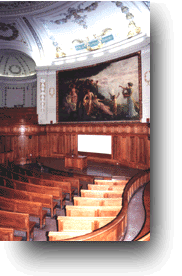
[Image: Richelieu amphitheater]
First, he says he was a student for “years,” which means at least two. The Descartes and Richelieu amphitheaters are large lecture halls where the professors give their lectures to students enrolled in their course. Daniel Lagache held the chair of psychology at the Sorbonne beginning in 1947; during the war he was active in the Resistance and had been imprisoned. This would make him especially attractive to Wiesel. I believe that one could manage to attend lectures when there was space without being enrolled in the course. Note that Wiesel carefully writes “There were lectures …”, not anything suggesting he was a student of Daniel Lagache.
At the Collège de France, which was not the Sorbonne, lectures were open and free to the public. Louis Lavell was a religious philosopher recognized as a forerunner of the psychometaphysic movement.
Conclusion: If Wiesel were a real student at the Sorbonne for at least two years, it’s a certainty he would have more to say about it than that he remembers lectures given by one professor in the amphitheaters. What was his course of study, who were his teachers, how much time did he spend studying and what kind of grades did he get? Who were his fellow students?
Instead, he substitutes that he “devoured books” of an assorted nature, which only means he read a lot. He “wandered” among bookstores and parks. He “remembers the silence” of a library [the Sainte-Genevieve, which is not at the Sorbonne] and “chance encounters” in the Sorbonne courtyard. This all sounds enchanting, but it doesn’t sound like a hard-working student … and he would have had to work hard at that university.
The rest of what he wrote, in spite of his remembering Freud and Martin Buber, is just more open lectures, now in the Latin Quarter. This is the description of a dilettante taking advantage of what was available in the great city, picking and choosing what interested him, not fitting into any strict discipline of real schooling. There is no doubt in my mind, under our present knowledge, that he was not a student; thus it’s no wonder he remembers his “student years” in Paris as happy; he was basically doing as he wished. Remember, he was a student of the mystic Shushani during this time.
What we find in this instance is totally reminiscent of the single paragraph by which he described in his memoir another important undertaking in his life—the writing of his first manuscript after his 10-year vow of silence [Or was it actually nine years? He jumped the gun by one year, according to his memoir]. The reason he has so little to say? It’s pretty obvious it is because there was nothing there for him to remember.
But these few lines in his 1995 memoir cannot be the origin of the belief that he was educated at the Sorbonne, because Time magazine wrote in 1986, after Wiesel was awarded the Nobel Peace Prize, that “After the war Wiesel settled in France, where he studied philosophy at the Sorbonne…” Where did Time magazine get that information? What is the earliest source of it? It would be interesting to know this, but it’s not essential because we know that Wiesel’s own brief mention, written in 1995, is not convincing. Thus any earlier mention of it would not be convincing either.
Has damage control on the Sorbonne question begun?
Here is another odd fact.
On Elie Wiesel’s Wikipedia page, there is no mention of his attending the Sorbonne University, let alone being enrolled there–or at any school or university. Yet, it was previously there and has been removed. It currently says:
After World War II, Wiesel taught Hebrew and worked as a choirmaster before becoming a professional journalist. He learned French, which became the language he used most frequently in writing. He wrote for Israeli and French newspapers, including Tsien in Kamf (in Yiddish) [and] L’arche.(6) [Both are Jewish newspapers, the first being Zion in Kamf in English -cy]
But on the previous Wikipedia page found at : http://web.archive.org/web/20080804112451/http://en.wikipedia.org/wiki/Elie_Wiesel dating from Aug. 2008, found at a web archive, it was there. [See comment #1 below.] And I think it was there up to 2010; during this year the page was updated. It read:
After the war, Wiesel was placed in a French orphanage, where he learned the French language and was reunited with both his older sisters, Hilda and Bea, who had also survived the war. In 1948 he studied philosophy at the Sorbonne.
Why was it removed? Only one reason: Because someone at Wiki, or someone who can direct someone at Wiki, knows that Elie Wiesel did not study at the Sorbonne, and they would like it to appear that they never said he did. This is what is called Rewriting History because it’s done without telling readers what has been changed, and why.
A serious charge? Or do many of you accept it without complaint? Many of us know that the life history of Elie Wiesel was partly made up to begin with, so adding and subtracting parts of it, as research into his life uncovers some of the lies, may simply appear understandable damage control.
Yet, what about the “why”? Whose bright idea was it to pretend that Wiesel had “studied” at a famous university rather than tell the truth that he has never been a registered student since he left his hometown in Sighet at age 15. We have to believe that Wiesel himself began saying and implying this to give himself better credentials. He has never disputed it or set the record straight. Therefore, until we hear from him, we have to conclude that Wiesel thinks nothing of committing fraud – while he constantly points the finger of blame to so many of the rest of us.
The Wikipedia page for his book Night still mentions the Sorbonne:
From 1947–1950, he studied the Talmud, philosophy, and literature at the Sorbonne, attending lectures by Jean-Paul Sartre and Martin Buber.(7)
[That also has been removed from this Wikipedia page. cy -2025] It appears to be taken from his memoir, but is confusingly written, no doubt purposefully. Confusion abounds around the narrative of the life of Elie Wiesel, as this entire website Elie Wiesel Cons The World shows. You’re probably already familiar with the quote of Wiesel to the Rebbe that some things are true that never happened and vice versa. On another occasion Wiesel revealed how his mind works. This is from Elie Wiesel: Conversations by Elie Wiesel and Robert Franciosi. Wiesel responds to a question about one of his books:
In this book “One Generation After” there is a sentence which perhaps explains my idea: “Certain events happen, but they are not true. Others, on the other hand, are, but they never happen.” So! I undergo certain events and, starting from my experience, I describe incidents which may or may not have happened, but which are true. I do believe that it is very important that there be witnesses always and everywhere. (8)
From this, the reader can judge for him/herself what kind of a witness Elie Wiesel is. We can understand that “certain events” he experienced during the war gave him ideas to “describe incidents which didn’t happen” but could have happened and so are true in his mind. This exactly explains how he can say “every word is true” and “I have a tattoo on my arm.” My judgment is that Wiesel really missed out by not getting an education at the Sorbonne, which might have grounded him in reason and precise language. As it is, he lives in a mystical realm wherein things are true because he says they are … leaving him satisfied, his peace undisturbed.
Endnotes:
1. Elie Wiesel, Memoirs: All Rivers Run to the Sea, Alfred Knopf, 1995, pp. 154-55.
2. Collège de France is a separate institution across the street from the historical campus of La Sorbonne at the intersection of Rue Saint-Jacques and Rue des Ecoles […] What makes it unique is that each professor is required to give lectures where attendance is free and open to anyone, even though some high-level courses are not open to the general public. The motto of the Collège is “It teaches everything;” its goal can be best summed up by Maurice Merleau-Ponty’s phrase: “Not preconceived notions, but the idea of free thought.” http://en.wikipedia.org/wiki/Coll%C3%A8ge_de_France
3. Updated Dec. 2. Prof. O’Connell says that Wiesel made this statement in his interview book with Brigitte-Fanny Cohen entitled Qui etes-vous, Elie Wiesel?, Lyon, La Manufacture, 1987, p. 63: “For two years, every morning, I took classes at the Hôpital Sainte-Anne and observed the patients.” Please read Prof. O’Connell’s comment below [#3] and my reply. A portion of this interview was included in Elie Wiesel: Conversations, ed. by Robert Franciosi, University Press of Mississippi, 2002.
4. “Elie Wiesel and the Catholics,” Culture Wars magazine, Nov. 2004. Online at http://www.culturewars.com/2004/Weisel.htm
5. This phenomenon is not limited to the Internet; historians also quote from the published work of other historians without knowing the truth of it. It’s enough for their source to be from a recognized scholar or writer from a recognized university.
6. http://en.wikipedia.org/wiki/Elie_Wiesel#cite_ref-11
7. http://en.wikipedia.org/wiki/Night_(book)
8. http://books.google.com/books?id=Ym8KcrzUZKYC&pg=PA32&lpg=PA32&dq=Elie+Wiesel,+Sorbonne&source=bl&ots=nahRgAmiLz&sig=PP17IzP9fhIZMFRfEg0sAWfpwDE&hl=en&ei=eSPbTK3CAZT0tgOfkqSaBw&sa=X&oi=book_result&ct=result&resnum=8&ved=0CFIQ6AEwBw#v=onepage&q=Elie%20Wiesel%2C%20Sorbonne&f=false
7 Comments
Category Featured | Tags: Tags: All Rivers Run to the Sea, damage control, Descartes and Richelieu amphitheaters, Sorbonne,
Social Networks: Facebook, Twitter, Google Bookmarks, del.icio.us, StumbleUpon, Digg, Reddit, Posterous.
 Just recently, the Chief Rabbi of France, Gilles Bernheim, has admitted to plagiary and lying about it.
Just recently, the Chief Rabbi of France, Gilles Bernheim, has admitted to plagiary and lying about it. Left: Bernheim with former French President Nicolas Sarkozy, also a Jew, who awarded him the Legion of Honor in 2010. Sarkozy said twice that Bernheim is an “agrégé de philosophie,” a very competitive academic distinction in France. Bernheim did not contradict him.
Left: Bernheim with former French President Nicolas Sarkozy, also a Jew, who awarded him the Legion of Honor in 2010. Sarkozy said twice that Bernheim is an “agrégé de philosophie,” a very competitive academic distinction in France. Bernheim did not contradict him.




